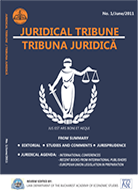The financial independence of the Romanian Parliament
The financial independence of the Romanian Parliament
Author(s): Verginia Vedinaș, Gabriela ConduracheSubject(s): Constitutional Law, Public Law
Published by: Societatea de Stiinte Juridice si Administrative
Keywords: Romanian Parliament; financial independence; budget; financial law;
Summary/Abstract: Romania is a unitary state and constitutional democracy organised under the principle of the separation of powers between the three branches of government – legislative, executive, and judicial – and the checks and balances between them. Since its creation in 1862, the Romanian Parliament has traditionally been a bicameral legislature, except during the communist era, a period during which it only had a single house. The desire to put an end to the top-down policies that characterised the communist era was an impetus for Romanian voters to return the legislature to its former bicameralism by recasting the Romanian Parliament as a legislature composed of two houses, the House of Representatives and the Senate. Senators and representatives are elected to four-year terms by universal suffrage in free, secret, and equal popular elections. Both representatives and senators are elected via the same voting mechanism, that is, by party list proportional representation. The manner in which the two houses are organised and function, as well as their funding, is set out in the Constitution and in a number of legislative and regulatory texts. In a first part (1), this article will analyse the rules for creating, implementing, and auditing the budgets of the two houses – which are the result of a patchwork of laws and regulations governing the Romanian Parliament – setting the stage, in a second part (2) for the evaluation of the quantitative change in the two houses’ budgets, as well as the different ways of overseeing their spending.
Journal: Tribuna Juridică
- Issue Year: 9/2019
- Issue No: 19
- Page Range: 392-401
- Page Count: 10
- Language: English

